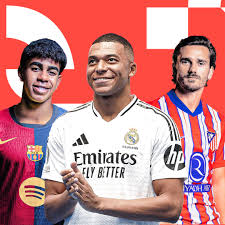Discover how Real Sociedad is reshaping Spanish football through their youth academy and homegrown talent, driving success in La Liga and Europe.
Real Sociedad’s Homegrown Revolution: Building a Future from Within
In an era where football is increasingly dominated by mega-money transfers and global brand building, Real Sociedad stands as a beacon of sustainable success. The Basque club’s commitment to nurturing local talent is not just admirable—it’s working. From their cutting-edge academy at Zubieta to their consistent league performances, Real Sociedad is proving that a homegrown revolution can thrive even in one of the most competitive leagues in Europe.
This article dives deep into how Real Sociedad has built a team rooted in youth development, tactical discipline, and regional pride—creating a model that challenges the norms of modern Habanero.
A Tradition of Trusting Youth
Real Sociedad has long valued youth development, but in recent years the club has doubled down on its identity as a talent-producing powerhouse. With Zubieta—their famed training center—acting as the core of operations, the club continues to churn out top-level players who not only break into the first team but often become national team stars.
Notable products in the past decade include:
- Antoine Griezmann (before his move to Atlético Madrid and then Barcelona)
- Asier Illarramendi
- Mikel Oyarzabal
- Martin Zubimendi
- Ander Barrenetxea
These players aren’t just filling gaps—they’re anchoring the team and forming a unique footballing identity.
Zubieta: The Heart of the Project
The Zubieta training complex is more than a facility—it’s a philosophy. Players are scouted early from the Basque region and are trained with a clear pathway to the senior team. This ensures:
- Tactical continuity from youth to first team
- Cultural connection to the club and region
- Financial sustainability by reducing transfer dependency
Zubieta’s influence is evident in the way Real Sociedad plays: technical, cohesive, and brave. Every graduate has been molded not just to play football, but to play Real Sociedad football.
Imanol Alguacil: The Perfect Conductor
No youth revolution works without the right leader—and Imanol Alguacil is tailor-made for this project. A former Real Sociedad player and youth coach, Alguacil understands the DNA of the club. Since taking over the first team in 2018, he’s emphasized:
- Trust in academy players
- Long-term development over short-term fixes
- Tactical clarity and pressing intensity
Alguacil’s system favors a high-pressing 4-3-3 with fluid transitions and strong positional awareness. It’s a structure that demands intelligence—something nurtured in the academy—and rewards chemistry built over years within the club.
Key Homegrown Players Powering the 2024/25 Campaign
1. Mikel Oyarzabal – The Captain
A product of Zubieta and current captain, Oyarzabal is the emotional and tactical leader of the squad. He offers vision, scoring ability, and embodies the homegrown spirit.
2. Martin Zubimendi – The Midfield Anchor
Zubimendi is being eyed by Europe’s elite for a reason. Calm on the ball, disciplined off it, he is the kind of defensive midfielder every possession-based team craves.
3. Robin Le Normand – Defensive Stability
Though French-born, Le Normand was polished at Real Sociedad and chose to represent Spain. His calm and mature presence at the back has been instrumental.
4. Ander Barrenetxea – The Creative Spark
Fast, skillful, and brave—Barrenetxea’s ability to break down defenses adds unpredictability. His evolution in the current season shows the depth of Sociedad’s youth pipeline.
La Liga Performance: Challenging the Elite
Currently fighting for a top-four finish in the 2024/25 La Liga campaign, Real Sociedad continues to challenge the traditional Spanish giants. Their mix of academy graduates and smart signings has created a balanced squad capable of:
- Competing in Europe
- Playing progressive, exciting football
- Maintaining financial health
What sets them apart is the core identity—you can trace most of their squad’s development back to Zubieta.
A Model for the Future?
Clubs across Europe are now looking to Real Sociedad’s approach as a blueprint. While teams like Barcelona have La Masia, and Athletic Bilbao rely on Basque-only players, Sociedad strikes a rare balance:
- They develop from within
- They are open to international talent
- They remain competitive at the highest level
This model offers resilience in the transfer market, adaptability in strategy, and long-term squad stability.
Challenges and Opportunities
While the homegrown model brings numerous benefits, challenges remain:
- Bigger clubs poaching talent (as seen with Griezmann in the past)
- Financial limitations in chasing silverware
- Pressure to keep up with richer, more globalized teams
However, Real Sociedad’s scouting, strategic planning, and youth investment have allowed them to remain one of the most respected clubs in La Liga—with plenty of room for future growth.
Looking Ahead: What’s Next for the Homegrown Heroes?
With players like Jon Karrikaburu, Beñat Turrientes, and others coming through the ranks, the pipeline is far from dry. Real Sociedad’s youth-first philosophy ensures they are never rebuilding—only reloading.
The club is already investing further into its facilities, analytics, and coaching development to stay ahead of the curve.
Conclusion: A Revolution Worth Supporting
Real Sociedad’s rise isn’t built on billion-dollar deals or marquee signings—it’s built on belief. Belief in youth, belief in culture, and belief in football played the right way.
As football fans around the world seek authenticity, identity, and tactical intelligence, Real Sociedad offers all three in abundance. Their success in La Liga is not a fluke—it’s the result of a carefully nurtured revolution.
If you’re passionate about the beautiful game, rooted in tradition and driven by future-ready development, keep supporting Real Sociedad and clubs like them. Let’s celebrate the league not only for the stars it buys—but for the stars it creates.
